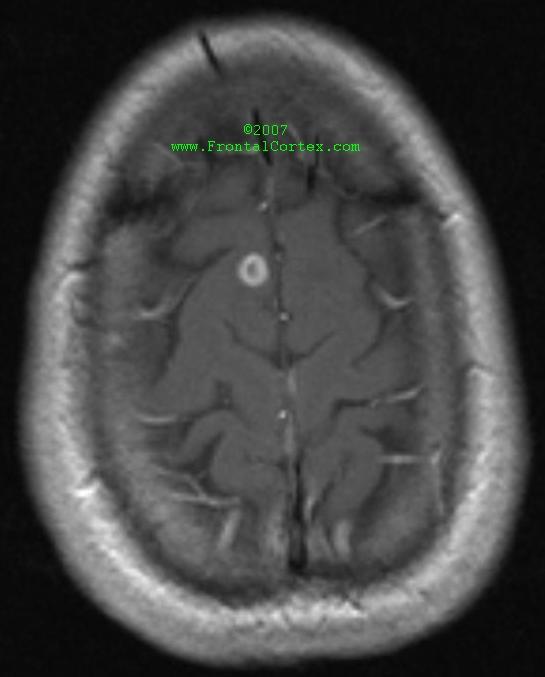New onset epilepsy in an adult
Topic: Pharmacology
Created on Sunday, September 9 2007 by jdmiles
Last modified on Sunday, September 9 2007.
A 42-year old Hispanic male presents with recent onset of seizures. The seizures are described as focal with secondary generalization. He has no other complaints, and his past medical history is unremarkable. He has no family history of epilepsy. He drinks in moderation, does not smoke, and denies use of illicit substances. He moved to the United States from Mexico approximately 1 year earlier. Physical exam and laboratory studies are normal. An MRI of the brain is obtained, and is shown below.
Which of the following medications is most likely to result in definitive long-term reduction in generalized seizures?
This question was created on September 09, 2007 by jdmiles.
This question was last modified on September 09, 2007.
ANSWERS AND EXPLANATIONS
A) Albendazole
This answer is correct.
This patient has neurocysticercosis, the single most common cause of acquired epilepsy in the developing world. Treatment with albendazole (800mg per day) and dexamethasone (6mg per day) has been shown to significantly reduce the number of seizures with generalization in patients who are already receiving antiepileptic medications. (
See References)
|
 |  |  | 
|  |  |
| Please log in if you want to rate questions. |
B) Penicillin
This answer is incorrect.
This patient has neurocysticercosis, the single most common cause of acquired epilepsy in the developing world. Treatment with albendazole (800mg per day) and dexamethasone (6mg per day) has been shown to significantly reduce the number of seizures with generalization in patients who are already receiving antiepileptic medications. (
See References)
|
 |  |  | 
|  |  |
| Please log in if you want to rate questions. |
C) Ethosuximide
This answer is incorrect.
This patient has neurocysticercosis, the single most common cause of acquired epilepsy in the developing world. Treatment with albendazole (800mg per day) and dexamethasone (6mg per day) has been shown to significantly reduce the number of seizures with generalization in patients who are already receiving antiepileptic medications. (
See References)
|
 |  |  | 
|  |  |
| Please log in if you want to rate questions. |
D) Doxorubicin
This answer is incorrect.
This patient has neurocysticercosis, the single most common cause of acquired epilepsy in the developing world. Treatment with albendazole (800mg per day) and dexamethasone (6mg per day) has been shown to significantly reduce the number of seizures with generalization in patients who are already receiving antiepileptic medications. (
See References)
|
 |  |  | 
|  |  |
| Please log in if you want to rate questions. |
E) Haloperidol
This answer is incorrect.
This patient has neurocysticercosis, the single most common cause of acquired epilepsy in the developing world. Treatment with albendazole (800mg per day) and dexamethasone (6mg per day) has been shown to significantly reduce the number of seizures with generalization in patients who are already receiving antiepileptic medications. (
See References)
|
 |  |  | 
|  |  |
| Please log in if you want to rate questions. |
References:
| 1. Garcia, H.H., Pretell, E.J., Gilman, R.H., Martinez, S.M., Moulton, L.H., Del Brutto, O.H., Herrera, G., Evans, C.A., and Gonzalez, A.E. (2004). "A trial of antiparasitic treatment to reduce the rate of seizures due to cerebral cysticercosis." N Engl J Med, 350(3) 249-58. (PMID:14724304) |  |
| 2. (2006). "Meta-analysis: Cysticidal drugs for neurocysticercosis: albendazole and praziquantel." , 145(1) 43-51. (PMID:16818928) |  |
|
 |  |  | 
|  |  |
| Please log in if you want to rate questions. |
FrontalCortex.com -- Neurology Review Questions -- Neurology Boards -- Board Review -- Residency Inservice Training Exam -- RITE Exam Review
pharmacology
New onset epilepsy in an adult
Question ID: 090907122
Question written by J. Douglas Miles, (C) 2006-2009, all rights reserved.
Created: 09/09/2007
Modified: 09/09/2007
Estimated Permutations: 9870120

























